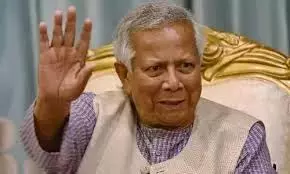Bangladesh Interim Govt Signals Longer Stay
The unscheduled meeting was called in the wake of Mr Yunus’ threat to resign. The meeting discussed elections, reforms and trial -- the three main responsibilities assigned to the interim government.

New Delhi: Amid mounting tensions with the Army and pressure from political parties like the Bangladesh Nationalist Party (BNP), the interim government of Bangladesh is trying to build its case for a longer stay. On Saturday, the Muhammad Yunus government went into a huddle and after a closed-door meeting of the advisory council, it was announced that Mr Yunus will continue to be the head of the interim government and will take a call on elections and other reforms at an appropriate time.
The unscheduled meeting was called in the wake of Mr Yunus’ threat to resign. The meeting discussed elections, reforms and trial -- the three main responsibilities assigned to the interim government. Though the advisory council did not give any timeline, it is believed that after Eid the Bangladesh interim government may make some announcement about elections.
Mr Yunus had earlier said that polls could be held as early as December 2025 but that holding them in June 2026 would give the government more time for reform. It appears that Mr Yunus doesn’t want to abide by the December timeline.
The Bangladesh interim government believes that the Awami League, the BNP, the Bangladesh Army, the Bangladesh police and India are all on one side trying to destabilise them. With the backing of the Islamist forces like the Jamaat-e-Islami and the NCP, Mr Yunus is trying to push back the elections beyond June 2026, when current Army Chief Gen. Wakar-Uz-Zaman retires and then he can have a favourable person to support his government for a full term.
However, sources said there is tremendous dissent in the files and ranks of the Bangladesh Army, as they do not want policing. At the same time, the Army is also not interested in capturing power, sources said, adding it just wants a smooth transition of power to an elected government.
Making a case for its longer stay, Bangladesh's interim government on Saturday said in a statement that broader unity is essential to maintain stability, organise elections, conduct trials, take reform initiatives and permanently prevent the return of authoritarianism in the country.
Without naming the Army Chief or the BNP, Mr Yunus's team also said there was constant obstruction from certain quarters, and if this continues, then the government will go public about the reasons behind its inability to carry out promised work.
“If fulfilling the responsibilities of the government is made impossible, whether due to incitement by defeated forces or as part of foreign conspiracies, the government will present all reasons publicly and then make its next decisions accordingly. The interim government embodies the public expectations that arose from the July uprising. But if any actions obstruct the government’s autonomy, reform efforts, judicial processes, free and fair elections, or normal functioning and thereby make it impossible to carry out its mandated responsibilities, the government will take the necessary decisions in consultation with the people," a statement by the advisory council read.
It said that the council discussed at length “how various unreasonable demands, deliberate and unauthorised statements and disruptive programmes have been hindering the normal working environment and creating doubt and confusion among the public regarding the fulfilment of these responsibilities.”
The advisory council emphasised that in order to prevent the return of authoritarianism in the country, the interim government will listen to the positions of political parties and will clearly communicate its own stance, the statement added.
Later, Mr Yunus held talks with leaders of the BNP, Jamaat-e-Islami, and National Citizen Party. The BNP has been threatening to withdraw support to Mr Yunus if he doesn’t announce elections soon.
During its meeting on Saturday, the BNP reiterated its three demands. These are demands to hold elections by December, action against fascist forces should continue and three advisers from Mr Yunus’s team -- Asif Mahmud Shojib Bhuyain, Mahfuj Alam, and Khalilur Rahman -- should be removed.
As for reforms and the judicial process, the BNP leaders said that the interim government should declare elections and the next government can take those forward. The BNP said delaying elections may pave the way for the return to dictatorship.
On Saturday there were protests in parts of Bangladesh organised by student groups in support of Mr Yunus in a clear indication that he will not let go of power so easily and may even stay put for a full five-year term.
